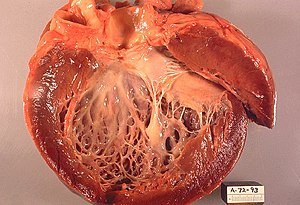心肌病
心肌病[8](英语:cardiomyopathy)也称心肌病变,是一组由不同病因引起的心脏机械和电活动异常的异质性心肌疾病的通称,以心肌形态、结构和功能异常为特点。
| 心肌病 Cardiomyopathy | |
|---|---|
 | |
| 切开的左心室,可以看到心内膜下的增厚,扩张和纤维化,伴随着心内膜白色部分的增加 | |
| 症状 | 呼吸困难、疲劳、水肿[1] |
| 并发症 | 心脏衰竭、心律不整、心搏停止[2][1] |
| 类型 | 肥厚型心肌病、扩张型心肌病, 限制型心肌病, 致心律失常性右心室发育不良, 肥大症型心肌病[3] |
| 病因 | 不明、遗传、酒精、重金属、淀粉样变、压力[4][3] |
| 治疗 | 依种类及症状而不同[5] |
| 患病率 | 2015年有250万人罹患心肌病和心肌炎[6] |
| 死亡数 | 2015年有35万4千人因为心肌炎而死亡[7] |
| 分类和外部资源 | |
| 医学专科 | 心脏病学 |
| ICD-11 | BC43 |
| ICD-10 | I42.042.0 |
| ICD-9-CM | 425.9、425、425.4 |
| DiseasesDB | 2137 |
| MedlinePlus | 001105 |
| Orphanet | 167848 |
心肌病在组织病理上,以心肌细胞发生变性、坏死为主,相对于心肌炎较无炎症变化,即使炎症性心肌病(inflammatory cardiomyopathy)也较初发急性心肌炎时较少炎症变化[9]。心肌病概括分为:肥厚性心肌病、扩张型心肌病、限制型心肌病、致心律失常性心肌病,和未分类心肌病,约5种类型;但各国际学术单位的分类方法均不同[10]。
体征及症状
编辑心肌病早期的症状可能很轻微,甚至没有症状[1]。有些会是因为心脏衰竭而有呼吸困难、容易疲倦或脚部水肿的情形[1],可能会有心律不整或是昏厥的症状[1]。心肌病变也会增加心因性猝死的风险[2]。
病因
编辑心肌病变通常没有明确的病因[4]。增生性心肌病变通常是遗传自父母,扩张性心肌病变则有三分之一是遗传所致[4]。扩张性心肌病变也可能是由酒精、重金属、冠心症、吸食古柯碱或病毒感染造成[4]。限制性心肌病变可能和淀粉样变性、血色素沉着病或某些癌症治疗有关[4]。心碎症候群是由非常极端的情绪或生理压力所造成[3]。
心肌病可分为只和心脏有关的,或是整体系统性失调的一部分,但两者都会造成心血管死亡,或是渐进性的,和心脏衰竭相关的病症。若是因为其他病症导致心肌功能的障碍(例如冠状动脉疾病、高血压或是心瓣膜的异常),则不列在心肌病中[12]。有些心肌病的病因仍不明,不过有些已识别出病因[13]:例如酒精就是造成扩张型心肌病的病因,而药物毒性及特定感染(例如丙型肝炎)也是心肌病的病因[14][15][16]。 没有治疗的乳糜泻也会导致心肌病,在长时间的诊断后结果可能会完全不同[17]。除了病因以外,目前也使用分子生物学以及基因学来识别不同的基因相关病因[15][18]。
心肌病较临床上的分类,如“肥厚型”、“扩张型”、“限制型”等[19],已经难以续用,因为有些病症在发展的过程中,可能同时会符合二种类型的条件。美国心脏协会目前的定义中,将心肌病分为一级和二级,前者只影响心脏,后者则是由其他身体部位的疾病所造成。此二类再依新的基因及分子生物学,进一步细分为不同的次分类[20]。
机制
编辑心肌病的症状可能包括体力消耗后的呼吸短促、疲劳,足部、腿部或腹部肿胀,另也可能有心律不整和胸痛的症状[11]。
随着分子技术进步,心肌病的病理生理学在细胞的层面上已有较多的了解。突变的蛋白质会扰乱收缩器(或机械力敏感的复合体)中的心脏功能。心肌的变化以及其细胞层面上的持续反应其造成的变化与突发性心因性死亡及其他心脏问题相关[21]。
诊断
编辑在诊断过程中,会用以下的程序来确诊是否有心肌病[11]:
分型
编辑心肌病变包括增生性心肌病变、扩张性心肌病变、限制性心肌病变、导致心律不整的右心室发育不全及心碎症候群[3]增生性心肌病变是心脏肌肉变大且变厚[3],扩张性心肌病变是心室的腔室变大且无力[3]。限制性心肌病变是心室壁硬化[3]。
心肌病有几种不同的分类标准[22]:
治疗
编辑治疗是依照心肌病变的型式和严重度而定[5],治疗方式包括改变生活型态、药物或手术[5]。在2013年时,罹患心肌病变和心肌炎的人数达到250万人[6],其中每500人有一人是罹患增生性心肌病变,而扩张性心肌病变则是在2500人中有一人[3][27]。同时,上述两种心肌病变所造成的死亡人数,从1990年的294,000人上升到443,000人[28][7]。导致心律不整的右心房发育不全则较常见于年轻族群[2]。
心肌病的治疗包括建议调整生活型态,以加强控制病症,另外治疗也依心肌病的分类与病症的情况而定,但多数会包括投药(保守的疗法),心律过低者植入心律调节器,心律情况可能致死者使用去颤器,若有严重的心脏衰竭则采用心室辅助器(VAD),若是有复发性心律失常,无法透过药物或是机械性心脏复律复原的,会采用烧蚀治疗。治疗的目的多半是在症状的缓解,有些病患会需要心脏移植。[11]
参考资料
编辑- ^ 1.0 1.1 1.2 1.3 1.4 What Are the Signs and Symptoms of Cardiomyopathy?. NHLBI. 2016-06-22 [2016-08-31]. (原始内容存档于2016-09-15).
- ^ 2.0 2.1 2.2 Who Is at Risk for Cardiomyopathy?. NHLBI. 2016-06-22 [2016-08-31]. (原始内容存档于2016-08-16).
- ^ 3.0 3.1 3.2 3.3 3.4 3.5 3.6 3.7 Types of Cardiomyopathy. NHLBI. 2016-06-22 [2016-08-31]. (原始内容存档于2016-07-28).
- ^ 4.0 4.1 4.2 4.3 4.4 What Causes Cardiomyopathy?. NHLBI. 2016-06-22 [2016-08-31]. (原始内容存档于2016-09-15).
- ^ 5.0 5.1 5.2 How Is Cardiomyopathy Treated?. NHLBI. 2016-06-22 [2016-08-31]. (原始内容存档于2016-09-15).
- ^ 6.0 6.1 GBD 2015 Disease and Injury Incidence and Prevalence, Collaborators. Global, regional, and national incidence, prevalence, and years lived with disability for 310 diseases and injuries, 1990-2015: a systematic analysis for the Global Burden of Disease Study 2015.. Lancet. 2016-10-08, 388 (10053): 1545–1602. PMC 5055577 . PMID 27733282. doi:10.1016/S0140-6736(16)31678-6.
- ^ 7.0 7.1 GBD 2015 Mortality and Causes of Death, Collaborators. Global, regional, and national life expectancy, all-cause mortality, and cause-specific mortality for 249 causes of death, 1980-2015: a systematic analysis for the Global Burden of Disease Study 2015.. Lancet. 2016-10-08, 388 (10053): 1459–1544. PMC 5388903 . PMID 27733281. doi:10.1016/s0140-6736(16)31012-1.
- ^ https://www.termonline.cn/word/1324163693122019330/1
- ^ Tschöpe C, Ammirati E, Bozkurt B, Caforio ALP, Cooper LT, Felix SB, Hare JM, Heidecker B, Heymans S, Hübner N, Kelle S, Klingel K, Maatz H, Parwani AS, Spillmann F, Starling RC, Tsutsui H, Seferovic P, Van Linthout S. Myocarditis and inflammatory cardiomyopathy: current evidence and future directions. Nat Rev Cardiol. 2021 Mar;18(3):169-193. doi: 10.1038/s41569-020-00435-x. Epub 2020 Oct 12. PMID 33046850; PMCID: PMC7548534.
- ^ 林曼欣, 吴林, 盛琴慧. 心肌病的分类及进展回顾 [J] . 中国心血管杂志, 2018, 23(1) : 81-86. DOI: 10.3969/j.issn.1007-5410.2018.01.019.
- ^ 11.0 11.1 11.2 11.3 11.4 What Are the Signs and Symptoms of Cardiomyopathy? - NHLBI, NIH. www.nhlbi.nih.gov. [2016-07-25]. (原始内容存档于2016-07-28).
- ^ Lakdawala, NK; Stevenson, LW; Loscalzo, J. Chapter 287. Kasper, DL; Fauci, AS; Hauser, SL; Longo, DL; Jameson, JL; Loscalzo, J (编). Harrison's Principles of Internal Medicine 19th. McGraw-Hill. 2015: 1553. ISBN 978-0-07-180215-4.
- ^ Pathophysiology of heart disease : a collaborative project of medical students and faculty. Lilly, Leonard S., Harvard Medical School. 5th. Baltimore, MD: Wolters Kluwer/Lippincott Williams & Wilkins. 2011. ISBN 1605477230. OCLC 649701807.
- ^ Adam A, Nicholson C, Owens L. Alcoholic dilated cardiomyopathy.. Nurs Stand (Review). 2008, 22 (38): 42–7. PMID 18578120.
- ^ 15.0 15.1 Westphal JG, Rigopoulos AG, Bakogiannis C, Ludwig SE, Mavrogeni S, Bigalke B, et al. The MOGE(S) classification for cardiomyopathies: current status and future outlook.. Heart Fail Rev (Review). 2017, 22 (6): 743–752. PMID 28721466. doi:10.1007/s10741-017-9641-4.
- ^ Domont F, Cacoub P. Chronic hepatitis C virus infection, a new cardiovascular risk factor?. Liver Int (Review). 2016, 36 (5): 621–7 [2018-06-19]. PMID 26763484. doi:10.1111/liv.13064. (原始内容存档于2017-09-23).
- ^ Ciaccio EJ, Lewis SK, Biviano AB, Iyer V, Garan H, Green PH. Cardiovascular involvement in celiac disease.. World J Cardiol (Review). 2017, 9 (8): 652–666. PMC 5583538 . PMID 28932354. doi:10.4330/wjc.v9.i8.652.
- ^ Simpson S, Rutland P, Rutland CS. Genomic Insights into Cardiomyopathies: A Comparative Cross-Species Review.. Vet Sci (Review). 2017, 4 (1). PMC 5606618 . PMID 29056678. doi:10.3390/vetsci4010019.
- ^ Valentin Fuster; John Willis Hurst. Hurst's the heart. McGraw-Hill Professional. 2004: 1884– [2010-11-11]. ISBN 978-0-07-143225-2. (原始内容存档于2013-05-27).
- ^ McCartan C, Maso R, Jayasinghe SR, Griffiths LR. Cardiomyopathy Classification: Ongoing Debate in the Genomics Era. Biochem Res Int. 2012, 2012: 796926. PMC 3423823 . PMID 22924131. doi:10.1155/2012/796926.
- ^ Harvey, Pamela A.; Leinwand, Leslie A. Cellular mechanisms of cardiomyopathy. The Journal of Cell Biology. 2011-08-08, 194 (3): 355–365. ISSN 0021-9525. PMC 3153638 . PMID 21825071. doi:10.1083/jcb.201101100. (原始内容存档于2016-09-28).
- ^ Vinay, Kumar. Robbins Basic Pathology. Elsevier. 2013: 396. ISBN 978-1-4377-1781-5.
- ^ 23.0 23.1 23.2 Maron, Barry J.; Towbin, Jeffrey A.; Thiene, Gaetano; Antzelevitch, Charles; Corrado, Domenico; Arnett, Donna; Moss, Arthur J.; Seidman, Christine E.; Young, James B. Contemporary Definitions and Classification of the Cardiomyopathies. Circulation. 2006-04-11, 113 (14): 1807–1816 [2016-08-01]. ISSN 0009-7322. PMID 16567565. doi:10.1161/CIRCULATIONAHA.106.174287. (原始内容存档于2016-08-20) (英语).
- ^ 24.0 24.1 Séguéla PE, Iriart X, Acar P, Montaudon M, Roudaut R, Thambo JB. Eosinophilic cardiac disease: Molecular, clinical and imaging aspects. Archives of Cardiovascular Diseases. 2015, 108 (4): 258–68. PMID 25858537. doi:10.1016/j.acvd.2015.01.006.
- ^ Rose NR. Viral myocarditis. Current Opinion in Rheumatology. 2016, 28 (4): 383–9. PMC 4948180 . PMID 27166925. doi:10.1097/BOR.0000000000000303.
- ^ Lipshultz, Steven E.; Messiah, Sarah E.; Miller, Tracie L. Pediatric Metabolic Syndrome: Comprehensive Clinical Review and Related Health Issues. Springer Science & Business Media. 2012-04-05: 200. ISBN 9781447123651. (原始内容存档于2016-05-29).
- ^ Practical Cardiovascular Pathology. Lippincott Williams & Wilkins. 2010: 148. ISBN 9781605478418. (原始内容存档于2016-09-14).
- ^ GBD 2013 Mortality and Causes of Death, Collaborators. Global, regional, and national age-sex specific all-cause and cause-specific mortality for 240 causes of death, 1990-2013: a systematic analysis for the Global Burden of Disease Study 2013. Lancet. 2014-12-17, 385 (9963): 117–71. PMC 4340604 . PMID 25530442. doi:10.1016/S0140-6736(14)61682-2.
延伸阅读
编辑- Boudina, Sihem; Abel, Evan Dale. Diabetic cardiomyopathy, causes and effects. Reviews in endocrine & metabolic disorders. 2010-03-01, 11 (1): 31–39. ISSN 1389-9155. PMC 2914514 . PMID 20180026. doi:10.1007/s11154-010-9131-7.
- Marian, A. J.; Roberts, Robert. The Molecular Genetic Basis for Hypertrophic Cardiomyopathy. Journal of molecular and cellular cardiology. 2001-04-01, 33 (4): 655–670. ISSN 0022-2828. PMC 2901497 . PMID 11273720. doi:10.1006/jmcc.2001.1340.
- Acton, Q. Ashton. Advances in Heart Research and Application: 2013 Edition. Scholarly Editions. 2013. ISBN 978-1-481-68280-0.
参见
编辑- 体外反搏 (External counterpulsation therapy (ECP))
外部链接
编辑